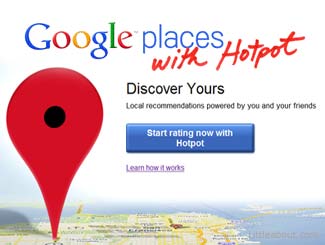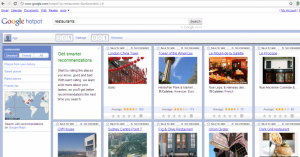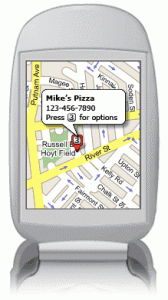UK shopping market maybe smaller than the US one, but Google wants to make an impact on it as well, introducing Google Nearby Shops UK. Now, when you query for certain product via UK Google Product Search, you will have the shops selling it appearing map-style below your search, to help you locate the closest item to your location.
Of course, if you are a merchant and want to take advantage of this feature, becoming listed in those results, you need to have your shop’s URL linked to both Google Places and Google Merchant Center.
For both buyers and sellers, this combination of Google Maps and Google Products can be very useful in this Holiday season.
You might have noticed that starting mid-December, Google is labeling certain websites with “this site may be compromised” notice that appears in the search results under the website’s link. According to Google’s Matt Curtis, this is actually done to help webmasters, noting that their website is probably being hacked. The procedure of banning sites from Google search index as noting the owners via Google Webmaster tools has proved “too slow” as not many site owners check their Webmaster Tools notifications on regular basis.
As the hacked website does not usually present an immediate threat to the visitor (if malware is detected, Google Search will show the more aggressive “This site may be harmful to your computer” message), the “this site may be compromised” notice is destined mainly towards owners, who constantly monitor their website appearance in Google search, urging them to pay an immediate attention to the problem.
With Goggle introducing its new tool, the Google Books Ngram Viewer several days ago, many were enthusiastic about this being an ultimate feature to use in etymological research. After all, the Ngram Viewer allowed to search millions of books (Google books, of course) and then check, track, and analyze the appearances of any word throughout many centuries.
The users were enthusiastic at first, but it turned out that the tools is far from perfect. According to recent review, there are many problems and inaccuracies in Ngram Viewer reports – both expected and unexpected. A very basic issue is the OCR – Optical Character Recognition. Even for modern books and fonts, there are occasional mistakes that occur, best OCR programs report just below 1% percent error margin for a text of recognized words. For books from the 16th and 17th centuries, with the artistic fonts this margin is sure to be higher. One example is the letter “s” confused with “f” on numerous occasions.
Another problem observed is that for the first occurrence, as Google Books NGram Viewer does not take into account the developing of language over time, thus you have to research several forms of the world used throughout the centuries to find the actual first usage. And also, there are the reprints. Many Google books are labeled with the year of their print, instead of the year of the original manuscript, making the search produce more hits for “recent” years.
Overall, Google Books Ngram Viewer is not bad. It is just not as reliable as one could think it is. Suitable for occasional queries, it cannot be considered as reliable tool in serious academic research.
After Google had announced its intention to acquire the renowned flight data provider ITA (the offer stands, reportedly, at 700 million USD), several serious questions arouse. Wouldn’t it be too much a step towards monopoly? What are the benefits for the customers? Why, the hell, Google is buying ITA at all?
Well, the answer to the last question is pretty obvious. In recent years, Google seems to enter every niche available in the market. Long gone are the times when Google was just a search engine. Google maps, Google news, Google Sketch-up – more and more services are provided by the enterprise and some people are already asking – is Google a Search Engine or your ultimate competitor?
However, the Google ITA offer has now encountered a serious opposition itself. A group of businesses, namely the Fairsearch.org, have gathered together in order to prevent the deal. With ITA serving about two thirds of airline ticketing and satellite websites, the ultimate “danger” – according to the Fairsearch claim – is that Google will eventually start selling tickets directly, while it has a control of data flow towards potential competitors.
Google, of course, claims that the intention is purely to improve the service, making flight data offered by Google more reliable and continuing to redirect the searchers to other websites that offer flight tickets.
With the consequences of this case remain to be seen , one thing is clear – more and more businesses (including the giants like Microsoft and Expedia) are concerned with Google taking over.
Google has recently announced that Google Instant Mobile is now available “globally”. This means that the tool is released for all countries that have Google Mobile access (there are several dozens of those) and supports almost thirty languages.
The product, similarly to Google Instant Mobile, is integrated into search features for any Android browser (built-in for Android OS 2.2 and up) , and features various algorithms that allow faster dynamic search results.
Although this release was expected (shortly after releasing Google Instant Mobile in English, the company had announced that international support is on its way) – nobody anticipated that this would happen so quickly. The roll-out took Google slightly over one month time – an incredible figure, considering the complexity of the product. Of course, this simply means that Google had been working on globalization of Google Instant Mobile simultaneously with the product itself. That is no wonder – Google had always emphasized the importance of international marketing and global support.
Telemarketing was never a part of Google business strategy. The idea was to spread the information, get recognizable and make the clients come to them, asking for services. That’s were the sales managers stepped in, offering a variety of products, bargain deals and impressing the customer.
However, according to latest news, this has recently changed. Several hundreds of telemarketers are employed by the company, their task being to sell Google Boost and Google Tags services to local businesses at several markets in the US.
It seems the Rubicon has been crossed and Google has now “recognized” that some niches and companies should be addressed directly rather than by advertising. The next question, which should be probably answered in few months time, is whether they will expand their own telemarketing group (reportedly currently measuring 300 employees) or try to purchase an established sales force.
After all, with Groupon denying “the 6 billion offer”, Google has some money to spare…
Everybody knows that since the introduction of the new Caffeine index, Google is able to update its site indexing within hours and even minutes. Long gone are the days when we were shown some outdated “caption” of the website content that turned out as no longer present on the page. Different was the case with images, as Google Image Search indexing was still lagging behind. It could take a month or so for the recently added image to appear in Google Image Search results.
It appears Google, in its efforts to produce real time results, is now addressing this “problem”. Several users, who are following Google image indexing closely, have reported a major improvement in this field, stating that the new images are being indexed more fluently, appearing in Google Image Search results with a delay of several days only. This is yet another proof that non-textual content is becoming more and more popular among users, making it essential for proper SEO.
I was reading my morning twitter feed and found an interesting new toy called how the world is searched. It looks like it might be a snap shot of 2010 Google Insights. Just some nice eye candy. Enjoy.
Today Google announced the release of their new operating system Google Chrome OS.
This is the follow up to the Google Chrome Browser which has had some success reaching about 10% market share. (based on data from http://marketshare.hitslink.com/).
The Google operating system is an open source alternative to Linux, offering a very fast and lightweight OS, which will probably load fast and work well (like most other Google products). We all know that Windows is a BIG, heavy and slow operating system, and although Windows 7 is a great improvement over Vista, it is by no means efficient.
The one problem I see with the release of the Google Chrome OS is that there are two kinds of people in the world; the Windows people who fear anything “not Microsoft Windows” and the tech savvy Microsoft hate group of Linux Users (who tend to love http://www.ubuntu.com/). I am not really sure where the market for the Google Chrome OS is coming from? I guess they may be able to peel a little off both groups, but the Microsoft Windows Users really think that their computers will not work without Windows.
I may have to take a closer look at the Google OS, will update you on my direct experience.
 Think of it this way – As we travel through a new type of landscape we are guided by signs as always. But the source of the signs and information is much different. Travelers are creating the guidelines and providing directions for the inquiring traveler. This is what happens with Google Profile. Users rate/review businesses, restaurants and service providers based on their experience.
Think of it this way – As we travel through a new type of landscape we are guided by signs as always. But the source of the signs and information is much different. Travelers are creating the guidelines and providing directions for the inquiring traveler. This is what happens with Google Profile. Users rate/review businesses, restaurants and service providers based on their experience.
If you are in a neighborhood that is popular with you and your circle of friends you can use Hotpot to find restaurants, bookstores, business offices etc. that will include the locations that are popular with your friends.
Here’s the recipe:
Add an ingredient with a decidedly local flavor to an icon of the Internet world and what do you get? Google Hotpot, a new dish that is seemingly a combination of Places and Profiles. What does this new menu item do for us, the user?
It helps us find local destinations, like businesses and restaurants.
This creates a large database of information in Places, of course. But it also helps the Internet behemoth with another task – making suggestions to users in the future. Add the “friend” touch and you have a referral and suggested destination business model called Hotpot that guides you to physical locations in your area.
How it Looks
A quick look reveals an uncluttered, almost simplistic, design – just what you would expect from Google. Hey, it works!!
Sign in and start rating, that’s all there is to it.

Obviously, you can do your rating and searching on your computer. But these actions are also available on the Android 1.6+ phone with the Google Maps 4.7 update.
At this point the emphasis is on good places to eat and drink – you know, restaurants and cafes. But Google Hotpot isn’t limited to consumption of food and beverages. Users can review any retail site, schools, libraries, even a nice park for a bit of quality time outdoors. A recent count by Google indicated that users have already placed millions of reviews on the service.
For example, one of the icons of Southern Illinois and the St. Louis Metro-East area is the Brooks Catsup bottle. This huge landmark is atop a tower in the town of Collinsville. Want to find this unusual site? It’s on Google Hotpot, complete with a color photograph and address.
Simply click on the number next to the average rating (five star system) and you can read the individual comments and reviews. Choose the business name – the live link at the top – and you are taken to a page with a map, address and review information. You may even get another photo.
Why Hotpot Now?
Most of the early reviews of Hotpot emphasize that this is a way for Google to take on such social sites as Facebook, Yelp and others. The focus is local. But there is supposed to be a significant difference with Hotpot. Reviews and information come only from people that are brought into your network.
The product manager for Google wrote, “With Hotpot, we’re making local search results for places on Google more personal, relevant and trustworthy.”
The idea is not particularly cutting-edge because there are several other ways to connect with friends and recommend places to spend time and money. For example, a user can select Yelp for the closest city and find all sorts of information about restaurants and other businesses.
But This is Google!
 That will capture a lot of attention. Throw in the Android access and Google Hotpot is coming into this market at a time when the Internet and World Wide Web are about “apps,” not searching. We are gradually moving into an electronic world that won’t require much searching. Some say we are there already.
That will capture a lot of attention. Throw in the Android access and Google Hotpot is coming into this market at a time when the Internet and World Wide Web are about “apps,” not searching. We are gradually moving into an electronic world that won’t require much searching. Some say we are there already.
We mentioned the key word “local” a bit earlier but we should have mentioned another key word in this scenario – “social.”
Social networking is far from new. In fact, we could argue that the Internet and the Web have been “social” for years. But with Hotpot, the world’s fastest-growing company, Google, is making a statement – We are more social. We are more local.
As one Hotpot review stated, this is the way things work now.
The Google LatLong Blog says Hotpot makes about 50 million locations available, as indicated on Google Places. Users step into the process to share their recommendations with friends, based on individual tastes and interests. When the iPhone Places app comes online Hotpot will add thousands more mobile users.
If all of this doesn’t seem earth-shaking, consider the one ingredient Google has that even the other social platforms don’t have. It’s called “consumer reach,” according to http://venturebeat.com/
Does this mean that Yelp and Foursquare will gradually wither and die on the vine? Probably not, at least for the very near future. But it is possible that Google Hotpot could be the killer app when it comes to navigating the local scene.
On a technical basis, Hotpot is, for the most part, a free-standing service. But if Google and its users decide to do some serious “mashing” and combining, Google Hotpot might stand next to “GPS” as the way to find your way around.
The merging of services hasn’t happened yet. Users still have to work with Hotpot on its own turf. But this will probably change sooner rather than later.
Some veteran industry observers are less than enamored of Google Hotpot. It’s nothing new or particularly useful, they say. What will the world say?
Stay tuned.